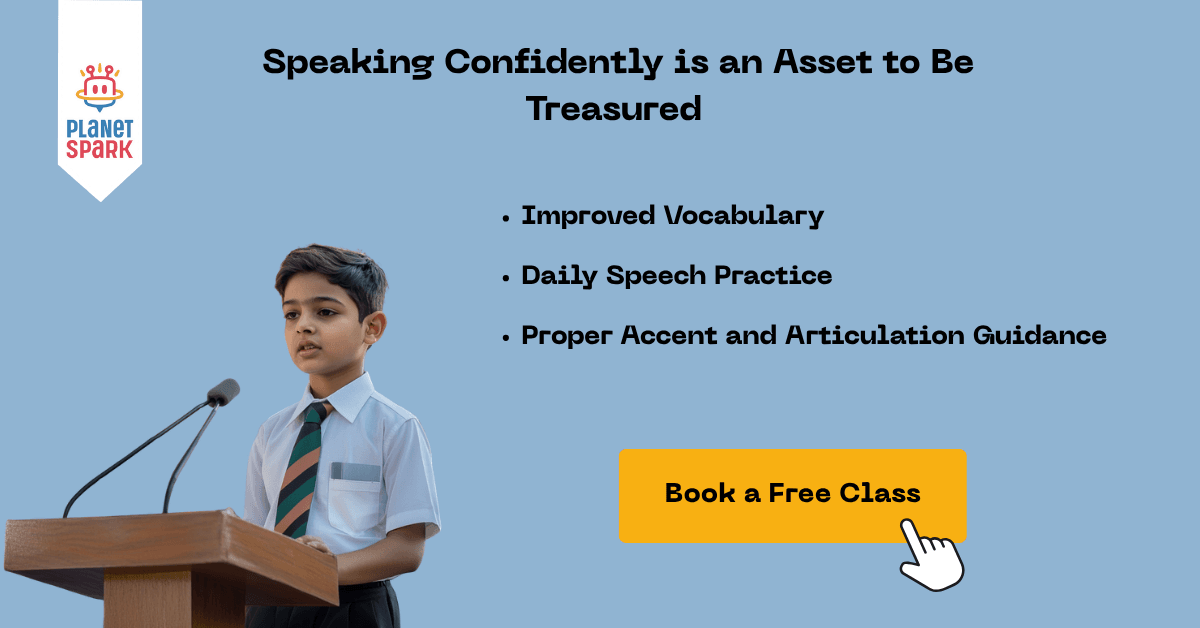How to Speak Good English in Public | Expert Tips for Kids
Last Updated At: 28 Jul 2025
13 min read

Table of Contents
- Understanding the Challenges of Public Speaking in English
- Shifting the Mindset: Building Confidence to Speak English i
- Structuring Your Speech: Clear, Simple, and Engaging Deliver
- Improving Fluency and Pronunciation
- Enhancing Body Language and Voice Modulation
- Building a Strong Speaking Vocabulary
- Practicing Regularly: Daily, Weekly, and Monthly Plans
- Tools and Platforms That Help You Practice
- Final Thoughts: Speaking Good English in Public is a Learnab
- Why Choose PlanetSpark for Public Speaking in English?
- Frequently Asked Questions (FAQs)
Whether it’s a classroom presentation, a debate, a job interview, or a stage event, the ability to speak good English in public plays a significant role in how you are perceived by others. Unfortunately, many students and professionals hesitate due to poor vocabulary, unclear pronunciation, or lack of confidence.
This blog will help you learn how to speaking good English in public using actionable strategies, structured practice, and real-world tools so you can express yourself clearly and confidently, regardless of your current English level.
Understanding the Challenges of Public Speaking in English
To improve your public speaking skills in English, you must first understand what makes it difficult. Most English learners face similar obstacles when speaking in public:
Fear of judgment: The fear of being mocked for incorrect pronunciation, grammar mistakes, or poor sentence construction is a major hurdle. This fear can paralyze your ability to speak clearly, causing hesitation or blank-outs.
Stage fright: Public speaking anxiety affects even fluent English speakers. When combined with the fear of using the wrong words or sounding unclear, it can become more intense.
Lack of fluency: Struggling to find the right words quickly or forming coherent sentences without pausing too often can affect the overall flow and impact of your speech.
Limited vocabulary: Repeating basic words like “nice,” “good,” “very,” or “thing” makes your speech sound repetitive and dull. A strong vocabulary adds power and variety to your public speaking.
Dependence on memorisation: Many learners write and memorize speeches word-for-word. While this might seem safe, it often leads to a robotic delivery and makes it harder to adjust when something goes off-script.
Once these challenges are acknowledged, they can be addressed through consistent training and the right learning methods.

Shifting the Mindset: Building Confidence to Speak English in Public
Public speaking is not just about language, it is about confidence, clarity, and mindset. Before improving your speaking techniques, you must prepare mentally for public expression.
Understand your audience: Remember, your audience is not looking for perfection. They are there to hear your message, not judge your grammar. Shifting your focus from "being correct" to "being clear" changes everything.
Reframe nervousness as energy: Research shows that people who interpret nervous energy as excitement are more likely to perform well. Instead of thinking “I’m scared,” say “I’m ready.”
Use breathing exercises to stay calm: Simple techniques like box breathing (inhale for 4 seconds, hold for 4, exhale for 4, hold for 4) can help calm nerves and steady your voice.
Practice in safe environments: Start speaking in front of family, friends, or even a mirror. Record your speech and review it. When you practice often, your brain starts to treat public speaking as a regular task, not a threat.
Avoid perfectionism: Mistakes are part of growth. Instead of trying to deliver a flawless speech, aim to connect with your audience. Speak clearly, pause when needed, and focus on your message.
With these mindset shifts, you will feel more prepared to take the next step, structuring and delivering your content effectively.
Structuring Your Speech: Clear, Simple, and Engaging Delivery
When you know what to say but don’t know how to structure it, your message can feel scattered or hard to follow. A well-organised speech ensures your ideas flow logically and keep your audience engaged.
Start with a hook: Grab attention right at the beginning. Use a question, a personal story, a surprising fact, or a relatable scenario to make the audience curious.
Use the rule of three: Divide your content into three main points. For example, if your topic is “Why Reading is Powerful,” your three sections could be: builds knowledge, enhances imagination, and improves vocabulary.
Support with examples: Real-life examples or short stories help your audience connect emotionally. Don’t just say “teamwork is important” share a short anecdote from your life that illustrates this.
Use connectors for flow: Words like “firstly,” “next,” “however,” “in conclusion,” “for example,” and “on the other hand” make your speech smoother and easier to follow.
End with a strong conclusion: Summarise your message and leave your audience with a final thought, call to action, or question to reflect on. Your closing line should be memorable.
This structure gives clarity to your thoughts and makes your delivery more effective even if your vocabulary is still developing.
Clear Speech. Powerful Words. Confident Delivery. Book A Free Trial Now!
Improving Fluency and Pronunciation
Fluency is what makes a speaker sound confident and natural. You may have great ideas and a strong vocabulary, but without smooth delivery and clear pronunciation, your message may not be impactful.
Practice shadowing: Listen to fluent English speakers and mimic their speech in real-time. TED Talks, news channels, and audiobooks are great sources. Imitating speech patterns builds fluency and pronunciation accuracy.
Speak in chunks, not words: Instead of speaking word by word, group words into phrases. For example, say “I want to improve my English” as one unit, not “I / want / to / improve…”
Slow down to sound better: Speaking too fast can lead to mistakes and unclear speech. Slowing down helps your audience understand you better and gives you more time to think.
Record yourself regularly: This helps you catch pronunciation errors and track your progress over time. Apps like Orai or PlanetSpark’s public speaking modules provide real-time feedback.
Use tongue twisters and phonics drills: These exercises train your tongue and mouth muscles to form sounds correctly. Start with simple ones like “She sells sea shells” or “Red lorry, yellow lorry.”
Fluency takes time, but small improvements every day add up to major progress over a few weeks.
Enhancing Body Language and Voice Modulation
Public speaking is as much visual and auditory as it is verbal. The way you carry yourself and the tone you use can either strengthen or weaken your message.
Maintain an open posture: Stand tall, with shoulders relaxed and feet firmly planted. This body position makes you feel and appear confident.
Use hand gestures naturally: Movements that match your words make your message easier to understand. Avoid crossing your arms or keeping hands in your pockets.
Make purposeful eye contact: Instead of scanning the entire audience, speak directly to one person for a few seconds, then shift to another. This creates a stronger connection.
Vary your tone and pitch: Avoid speaking in a flat tone. Emphasise important words, raise your tone to show excitement, and lower it to add seriousness or reflection.
Pause at the right time: Pausing after important points gives your audience time to absorb what you’ve said and makes your delivery more impactful.
Body language and vocal delivery are skills you can develop with practice and feedback.
Building a Strong Speaking Vocabulary
A rich vocabulary gives you more ways to express your thoughts and emotions clearly and accurately. Here are some practical ways to grow your speaking vocabulary:
Replace overused words: Instead of “very good,” say “excellent.” Replace “bad” with “terrible,” “awful,” or “disastrous,” depending on the context.
Learn word families and synonyms: Knowing that “create,” “creative,” “creation,” and “creativity” are related helps expand both vocabulary and comprehension.
Use a vocabulary notebook: Write down five new words every day. Include their meanings, usage in a sentence, and related synonyms or antonyms.
Play vocabulary games: Word games, puzzles, and interactive tools like the ones in PlanetSpark’s learning platform make vocabulary-building fun.
Practice using new words in speech: Don’t just learn words use them in real conversations or speeches so they become a natural part of your speaking vocabulary.
Regular vocabulary development enhances fluency, improves speech clarity, and boosts your confidence.
Help your child become a confident English speaker who can express thoughts clearly on any stage or platform. Book a free 1:1 public speaking session with PlanetSpark today
Practicing Regularly: Daily, Weekly, and Monthly Plans
Consistent practice is essential if you want to learn how to speaking good English in public. Here’s a structured plan that suits all levels:
Daily Speaking Practice:
Watch a 5-minute English video and shadow the speaker
Practice impromptu speaking on random topics for 3–5 minutes
Learn and use 3–5 new words in a sentence
Weekly Routine:
Deliver a 2-minute speech on a prepared topic and record it
Review and note areas of improvement
Join a language group, discussion forum, or online public speaking class
Monthly Challenge:
Participate in a debate, storytelling contest, or school presentation
Prepare a 5–10 minute speech on a meaningful topic
Get feedback from teachers, mentors, or peers
This gradual increase in practice intensity builds both language and presentation confidence.
Tools and Platforms That Help You Practice
Practicing in the right environment makes a big difference. These platforms and tools can help you get regular speaking practice:
PlanetSpark: Offers personalised 1:1 public speaking classes for kids and teens. Includes vocabulary games, debate clubs, storytelling, and presentation training.
Toastmasters International: Global speaking clubs where people practice speeches, leadership, and evaluations.
TED-Ed Clubs: Designed for students to research, write, and present ideas in a safe learning environment.
Orai App: Uses artificial intelligence to assess your speech and give real-time feedback on pace, clarity, and filler words.
Language exchange platforms: Apps like HelloTalk and Tandem connect you with native speakers and language learners for live conversations.
These platforms create safe spaces to practice and improve public speaking skills in English.

Final Thoughts: Speaking Good English in Public is a Learnable Skill
Anyone can learn how to speaking good English in public. It’s not about having a perfect accent or memorising a dictionary. It’s about expressing your ideas clearly, confidently, and meaningfully.
By working on your mindset, structuring your speeches, improving fluency, building vocabulary, and practicing regularly, you will transform from a hesitant speaker into a confident communicator.
Public speaking opens doors in school, college, career, and personal growth. Don’t wait to master it, start now.
Why Choose PlanetSpark for Public Speaking in English?
PlanetSpark offers a comprehensive, age-specific, and outcome-driven public speaking program that helps children become confident speakers.
Personalised 1:1 Sessions: Learn from expert trainers who focus on your strengths and areas for improvement.
Interactive Learning Tools: From vocabulary games to real-time speech analysis, every session is engaging and effective.
Real-World Practice: Debate clubs, storytelling sessions, and presentation challenges mimic real speaking environments.
Progress Tracking and Certification: Receive feedback, performance reports, and milestone certificates as you grow.
PlanetSpark makes the journey of learning public speaking in English fun, structured, and impactful.
Frequently Asked Questions (FAQs)
Q1. How can I improve my public speaking skills in English if I’m a beginner?
If you’re a beginner, start by building your confidence through small steps. Practice speaking in front of a mirror, record your voice, and focus on speaking slowly and clearly. Use simple sentence structures at first. Gradually, move on to practicing with family or friends and participating in group discussions. You can also join online spoken English classes with a personal trainer to get individual feedback.
Q2. What is the best way to practice English for public speaking?
The best way to practice public speaking in English is to speak regularly in structured and unstructured settings. Use the shadowing method to repeat after fluent speakers. Watch speeches, read aloud, and participate in discussions. You should also write short speeches and practice delivering them using proper tone, body language, and pauses. Apps like Orai and classes like PlanetSpark help with feedback and improvement.
Q3. Why do I hesitate while speaking English in front of others?
Hesitation in public speaking often stems from fear of making mistakes, limited vocabulary, or lack of speaking practice. It’s normal to feel nervous, especially when English is not your first language. To overcome hesitation, focus on daily spoken English practice, use positive affirmations, and build fluency through repetition. Remember, confidence grows with exposure and feedback.
Q4. How can I speak fluent English confidently on stage or in front of a crowd?
To speak fluent English confidently on stage, you need to prepare your content, rehearse aloud, and work on your delivery. Practice using real or simulated speaking environments, like storytelling sessions or mock presentations. Focus on your breathing, body posture, and voice modulation. Use cue cards or bullet points instead of memorising full texts. Confidence comes from repeated exposure and learning from each experience.
Q5. Do I need to have a strong vocabulary to speak good English in public?
A strong vocabulary helps you express yourself better, but it’s not mandatory in the beginning. You can still give a powerful speech using simple, clear words. As you gain confidence, you can gradually learn better alternatives and expand your vocabulary through reading, speaking, and listening to fluent English speakers. Using vocabulary-building apps or courses can also speed up your progress.
Q6. Can kids also learn how to speak English in public confidently?
Yes, absolutely. Kids can become confident public speakers with early exposure and regular practice. Interactive speaking activities like storytelling, show-and-tell, and debates can help them develop communication skills. Programs like PlanetSpark offer specialised public speaking courses for kids with 1:1 guidance, vocabulary training, and structured speech-building modules.
Q7. What are the common mistakes to avoid while speaking English in public?
Some common mistakes include speaking too fast, using filler words like “um” or “like,” reading from a script without eye contact, and using a flat or monotone voice. These can be avoided by preparing in advance, practicing voice modulation, using pauses, and being aware of your body language. Recording and reviewing your practice sessions can also help you identify and fix these issues.
Q8. What are some daily activities I can do to speak better English in public?
Daily activities include reading aloud from books or newspapers, recording and listening to your own voice, learning new words and using them in sentences, and watching English videos with subtitles. Practicing impromptu speaking for 2–3 minutes on random topics and summarising articles or shows in English also helps build fluency and confidence.
Q9. Is it okay to make mistakes while speaking English in public?
Yes, making mistakes is part of the learning process. Even native English speakers make errors. What matters more is how clearly you communicate your ideas. Focus on improving with each attempt, take feedback positively, and practice regularly. With time, your mistakes will reduce, and your speaking skills will improve.
Q10. How does PlanetSpark help improve public speaking in English?
PlanetSpark offers personalised 1:1 public speaking classes where learners get trainer-led coaching tailored to their level. The curriculum includes vocabulary enhancement, speech structure training, real-time speaking activities, debates, storytelling, and performance tracking. Learners gain confidence through repeated exposure and constructive feedback in a supportive environment.
Recommended Tests
Personalized Communication Report
Record a video to get a AI generated personalized communication report for your child
Select Learner's Class
